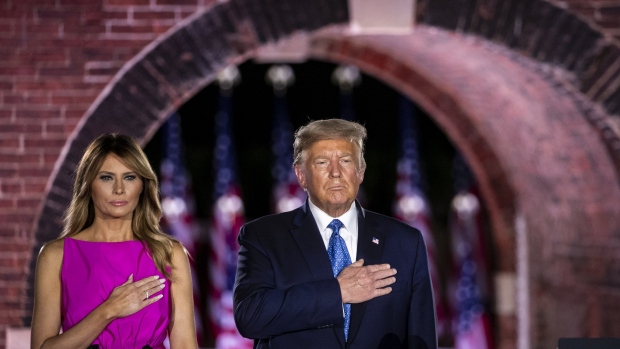Aug 27, 2020
Trump joins virus defense with economic appeal in election pitch
, Bloomberg News

Donald Trump gets his chance Thursday to make his best case for re-election to a nation still reeling from the coronavirus pandemic, with a speech to close the Republican National Convention seeking both to reverse perceptions of his handling of the crisis and paint him as the best steward of an economic recovery.
Trump will accept the Republican nomination for president from the South Lawn of the White House, an accommodation itself forced on him by the pandemic. His remarks will end a four-day convention that’s featured repeated denunciations of Democrats as radicals who seek to exploit the virus for political gain and snuff out the fledgling economic recovery.
The speech will serve in part as an answer to Democratic nominee Joe Biden’s searing indictment of the Trump administration’s response to the pandemic in his own nomination acceptance speech last week. And the president will look to position himself -- as he did during his 2016 convention -- as the lone person able to address the nation’s ills.
But Trump also wants voters thinking of issues beyond the 179,000 Americans killed by the virus so far, and is likely to echo the law-and-order nationalism offered by Vice President Mike Pence Wednesday night during his acceptance speech at Fort McHenry in Baltimore.
Pence’s remarks came as the nation was again roiled by racial unrest, this time by the case of Jacob Blake, a Black man in Kenosha, Wisconsin, who was repeatedly shot in the back by police. Professional basketball and baseball players refused to play in protest of the episode; and two people were killed in a Black Lives Matter protest over the Blake shooting and an Illinois teenager whose social media accounts carried pro-Trump and pro-police imagery was arrested in that crime.
On Thursday, attention was further diverted by the impending landfall of Hurricane Laura, a vicious Category 4 storm threatening the U.S. Gulf Coast. The president’s campaign aides said he planned to proceed with the evening’s political festivities while continuing to monitor the path of the dangerous storm.
And while Trump is likely to address both developments, the pandemic remains a central challenge for the president as he tries to resuscitate a bid for re-election that once revolved around the strength of the economy.
He is expected to argue that his administration should be applauded for increasing supplies of protective equipment and coronavirus tests, both of which were in perilously short supply for months after the U.S. was caught off-guard by a domestic outbreak that rapidly blossomed into the largest in the world.
He’ll boast of his administration’s push to manufacture ventilators, the supply of which now outpaces U.S. demand. And he has said he’ll tout the development and medical therapies, even as critics note they remain they remain in development.
“In our fight against the virus, we’ve launched this mobilization, and it’s the biggest since World War Two. Biggest and most successful, too,” Trump told supporters Monday in North Carolina. “You’ll be hearing that on Thursday night. I’m going to be talking about it because what we’ve done is incredible.”
A minority of Americans agree with him. About 62 per cent of voters believe the struggle against the coronavirus is “going badly,” according to a CBS News poll released Sunday, while just 27 per cent of Americans say things are going well overall. 65 per cent of people surveyed in the poll said the country is worse off than it was four years ago.
Convention planners have sought to counter those perceptions all week. Trump appeared Monday night in a video with health care workers and first responders, and the party has repeatedly played clips of Democratic politicians downplaying the virus in the pandemic’s early days and thanking Trump for federal support.
On Tuesday, first lady Melania Trump began her prime-time convention speech by expressing sympathy for Americans who had lost loved ones to the virus, a more direct and genuine display of empathy than the president himself has yet offered.
Second-Term Agenda?
While Trump’s top concern is persuading Americans that the pandemic has been better managed and more contained than they think, his advisers have indicated he’ll also look to outline a second-term agenda on Thursday. The president has struggled repeatedly in recent interviews to articulate any policy goals or ambitions if he’s re-elected, beyond further tax cuts.
On Sunday, his campaign released a 50-point “2nd Term Agenda” on its website.
“He will give a little bit of a look ahead of what he has in store as far as achieving more for the Americans, if the American people vote to re-elect him to a second term,” Trump campaign spokesman Tim Murtaugh said in a conference call with reporters on Wednesday.
“He will definitely talk about the economy -- the greatness of the economy before it was interrupted by the global pandemic,” Murtaugh said.
In his speech, the president is also likely to try to build momentum for executive actions he’s hoping can help consolidate support in the final weeks before the election. That includes long-promised measures he’s said will overhaul the immigration system, improve health care and lower drug prices while preserving protections for pre-existing conditions, and confront China.











